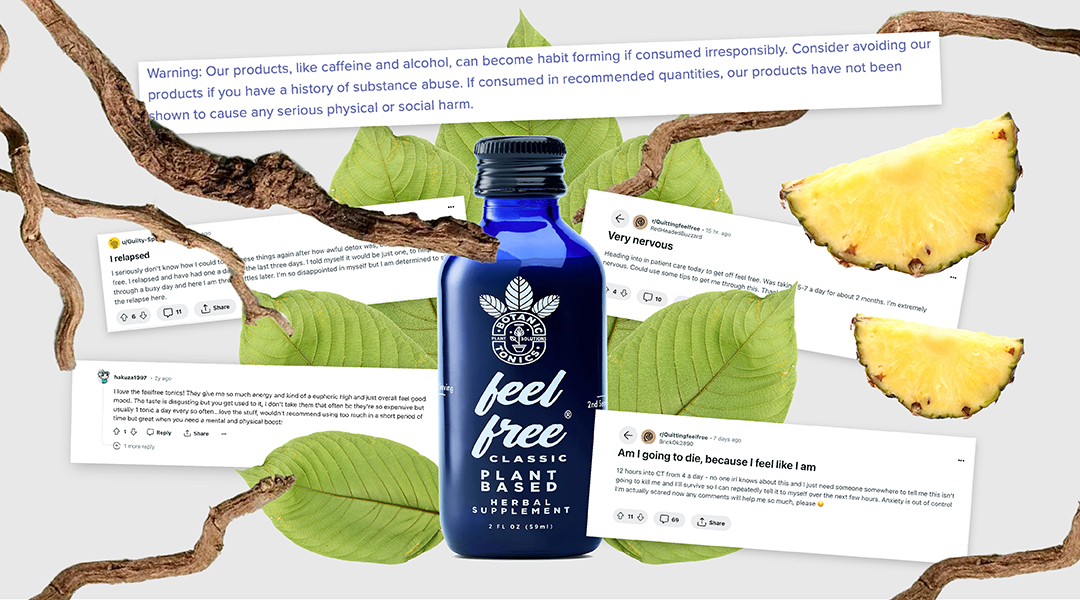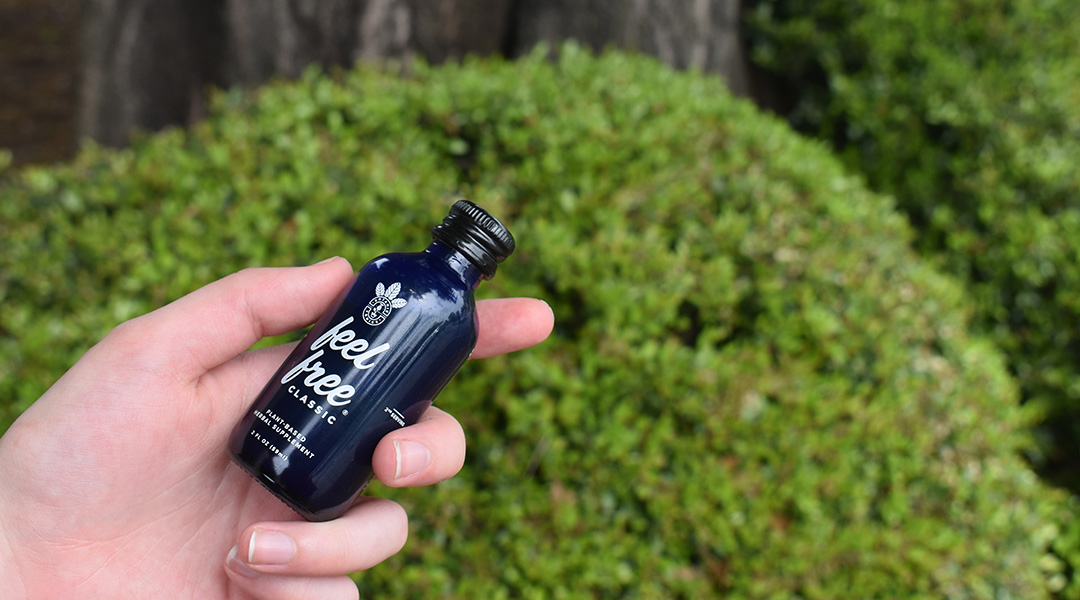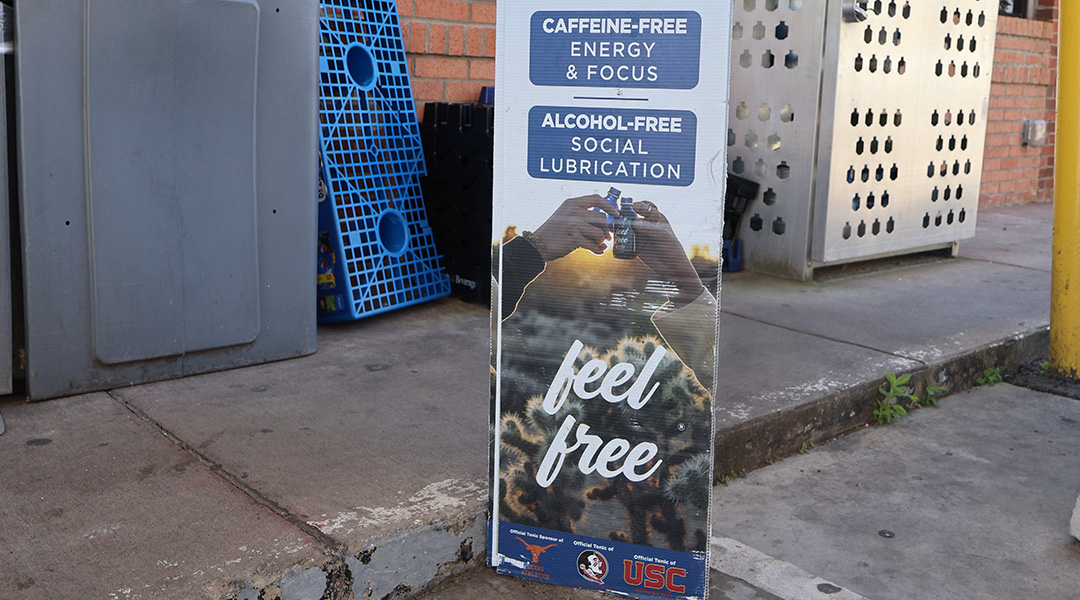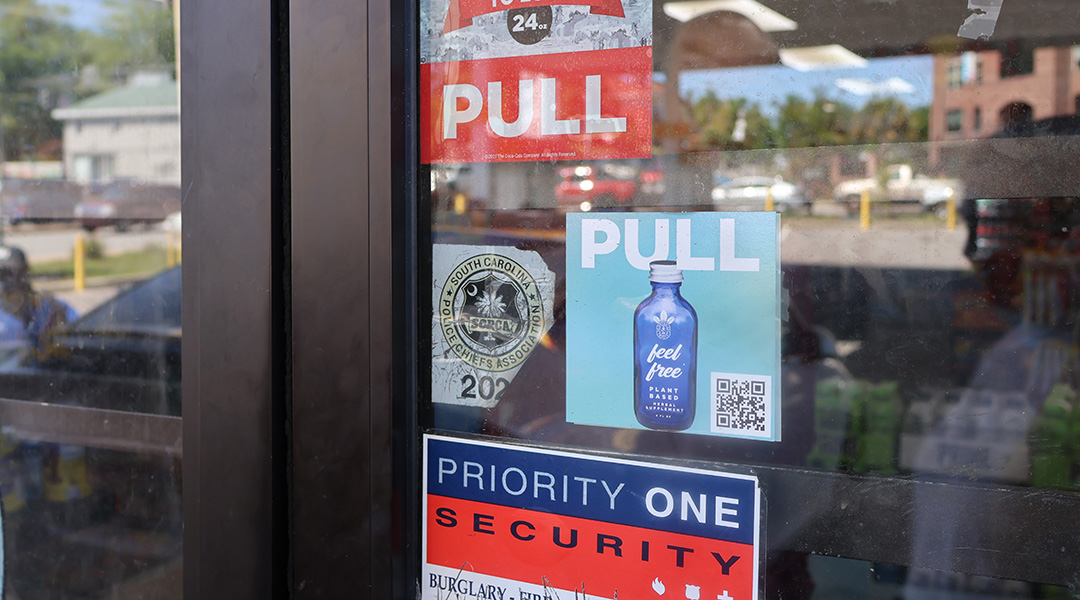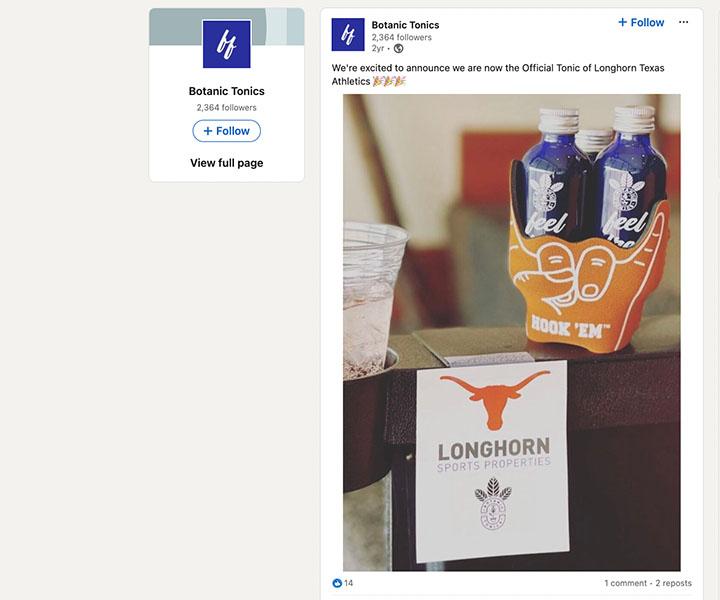Botanic Tonics warns people to consider not taking Feel Free Classic if they have a history of substance abuse. Some users of the product have reported positive experiences, but others say they’ve gotten addicted to it. (Photo illustration by Savannah Nagy/Carolina News and Reporter)
Corey Hayden, a technical sales engineer in Myrtle Beach, was no stranger to addiction. He used everything from hydrocodone to Percocet in his 20s and quit them all on his own terms.
The Carolina News and Reporter spoke to Hayden while he was undergoing medical detox in Mississippi from a product relatively new to the market, “feel free CLASSIC tonic.”
In 2020, when he was 38 years old, he said he had taken a short break from his then-alcohol habit to complete the fitness and mental wellness challenge 75 Hard. He was looking for a way to eliminate alcohol from his life entirely.
Hayden saw an ad on Facebook of one of his favorite fitness influencers endorsing the “plant-based herbal supplement,” and thought it might be the solution. It’s common for it to be endorsed in ads on social media, and the company, Botanic Tonics, quotes several testimonies on its website about its effectiveness, saying it provides a “clean energy boost,” a “mood lift” and “focus enhancement.”
“(Feel Free Classic felt like) opiates and Adderall, Xanax, and a little bit of ecstasy, honestly,” Hayden said. “It’s all in one. It’s like nothing I’ve ever taken.”
The tonic, which comes in a container about the size of a miniature alcohol bottle, is mainly made from kava root extract, which is a depressant, according to the Alcohol and Drug Foundation. It also includes ground kratom leaf, which is a stimulant in low doses – as when it’s properly consumed – and a depressant in high doses, according to the Drug Enforcement Administration.
Hayden said he did his research on kratom and tried numerous different kratom products. He thinks the bottle has proper warnings now, but he said it didn’t when he started taking it. The first time he ordered the sample box from the company’s website, he drank the whole bottle.
That exceeded the recommended single-use dosage: half a bottle at a time (1 ounce), and no more than one bottle (2 ounces) in 24 hours. “Anything that makes you feel good can become habit-forming,” the bottle says.
“I’ve had addiction problems my whole life and was always looking for something else over the counter that you feel like you can control and not get addicted to,” Hayden said. “I’m not a ‘half’ guy. … I knew what I was getting into.”
The FDA has issued warnings about using kratom for medical purposes, saying it could cause liver toxicity and substance use disorder. It also has warned against dietary supplements containing kava because of potential liver damage. Amid those concerns, plus multiple personal injury lawsuits against Botanic Tonics and stories in online forums of shattered lives, Feel Free is becoming easier to get in Columbia.
A display of bottles sits by the cash register at Smokers Town. It’s by the vapes at College Mart. Ads are in the parking lot at One Stop Liquor Store. Most people don’t know what Feel Free is. But a growing number of addicts speaking out say people are better off never finding out.
A class-action lawsuit, Torres v. Botanic Tonics, LLC, claims the Oklahoma-based company and 7-Eleven convenience stores failed to properly advertise potential side effects of Feel Free ingredients such as kratom – everything from addiction and withdrawal, psychosis and trouble sleeping to liver failure, high blood pressure, seizures or cardiac arrest. The product, developed in 2020, isn’t FDA-regulated.
The drink is marketed as a “healthy alcohol alternative,” according to the class-action lawsuit. Yet a warning on its website says, “Our products, like caffeine and alcohol, can become habit forming if consumed irresponsibly. Consider avoiding any potentially habit-forming substances if you have a history of substance abuse.” Use of the product in the recommended doses is safe, the company says. It’s abuse of the product that the company says it’s not responsible for.
A concentration of convenience stores sell the product in Columbia’s Five Points commercial district near the University of South Carolina. Many USC students visit such places to purchase junk food, alcohol, energy drinks or nicotine products – sometimes to help them stay awake to study but mostly to have fun.
Now, students can find Feel Free sitting in plain sight on the counter.
Feel Free combines ground kratom leaf with kavalactones, listed as “kava root (extract),” in an unusual blend. Kava root is an ancient plant used by Pacific Islanders for centuries as medicine. It is used in modern times as a dietary supplement and to treat anxiety and insomnia, according to the U.S. Department of Health and Human Services.
Kava was the subject of a 2002 advisory warning from the FDA that said “kava-containing dietary supplements may be associated with severe liver injury.” The FDA said kava-containing products have been associated with liver-related injuries, including hepatitis, cirrhosis and liver failure.
Kava also can cause digestive upset, headache, dizziness and impair one’s ability to drive, according to HHS. Long-term use of high doses can cause kava dermopathy, giving users dry, scaly skin with yellow discoloration, the department said, similar to the “alligator skin” one Columbia area resident reported.
People’s descriptions of how Feel Free makes them feel are wide-ranging. Some say it’s similar to a nicotine buzz. Others say it reminds them too much of the hard substances they had tried to quit.
Controlling the dosage
Botanic Tonics recognizes that every person is different and says the recommended dosage is not a hard and fast rule, according to a company spokesperson who participated in an hourlong interview and would only provide his first name, Aaron.
Some people get the effect they want from drinking a quarter of the bottle. Company CEO and founder JW Ross said he generally takes about one-and-a-half bottles a day, slightly more than recommended.
Hayden said he didn’t take Feel Free every day and was able to maintain a low dosage for a while after he signed up for the company’s monthly subscription delivery service.
When Feel Free began to be sold at two stores in the Myrtle Beach area, he said he caved and began drinking the tonic daily for nearly three years. When he tried to pull back, he realized he couldn’t go more than three days without buying a bottle.
“I think a lot of (the cause of addiction) is that it’s readily available,” Hayden said. “The dope man doesn’t take credit cards, and they do. It’s like, ‘Here it is, if you want it. Can you control it?’”
He said he had to maintain drinking at least six bottles a day to “feel normal,” because the tonic was controlling his anxiety but was no longer getting him high. At the peak of his addiction, he said, he was drinking up to 11 bottles a day, a dosage that made him feel “scared” and experience suicidal thoughts he’d never had before.
Hayden’s experience isn’t unique. An online forum is loaded with Feel Free users who say it has severely damaged them. Some of them say they have never dealt with addictions before and found themselves unable to stop. Some also say using the recommended dosage doesn’t stop them from working and functioning in their day-to-day lives.
An addiction, or even a habit, of using Feel Free is not cheap. A bottle goes for about $11 in-store. A 12-pack case can be purchased online for $157. Hayden got cases for $105 with his subscription. Having spent over $100 daily, he said he racked up more than $30,000 in credit card debt and had to take out a home equity loan to manage it.
He said his wife, and three children aged 15 or younger, knew about the tonic but didn’t know how much he was taking or how it was affecting him. Hayden hid the extent of his usage for years before extreme kidney pain and his mental health concerns forced him to make a change.
“They knew that it was better than drinking alcohol,” Hayden said. “‘Dad’s not drinking alcohol, but so long as he’s got that, it’s not the alcohol,’ So, in their mind, it was doing me better.”
Hayden checked into a medical detox facility on March 7 to treat his addiction. Some people say they could never kick this addiction alone.
“I’ve come off of hard drugs, and I couldn’t quit this without detox,” Hayden said. “That Feel Free calls you in a way that nothing else does.”
Hayden said the doctors who treated him at the detox facility had dealt with tianeptine, commonly called “gas station heroin,” a legal substance that produces similar withdrawal symptoms, according to the Mayo Clinic. They also knew about kratom and kava separately and were able to treat his withdrawals, which he said included restless legs, shakiness and internal pressure.
Hayden said by the fourth day of his detox, his withdrawal symptoms were under control. Then his subconscious urges began.
“You come out of a fog, and it’s like, ‘I’ll just have one,’ and there you go again,” Hayden said. “Straight back to the exact amount you were at to get what you’re looking for. For me, personally, that’s how it was. And then reading that forum, it seems like that’s the case for everybody.”
Carolina News and Reporter found Hayden online. He’s just one of more than 1,800 people who have joined the online Reddit forum “R/Quittingfeelfree,” many looking for support. The thread is flooded with testimonies from parents, working adults and young people across the country. They ask for advice on quitting, share their experiences with the product and emphasize one thing repeatedly: Feel Free isn’t worth it.
Other Feel Free Classic users have said in the Reddit forum “R/Kavakava” that they enjoy the product as it helps them focus and puts them in a good mood.
Hayden said he doesn’t know what his life will look like after detox, but he knows recovery will be a process.
“I’m going to hope that I’m able to just put it down, but I know I’m going to have days where I want to use,” Hayden said. “I mean, honestly, I’m scared to death.”
He said he has nothing against Botanic Tonics and praised the company for making a product that was the best he’d ever gotten over the counter and “works marvelously” as an alcohol alternative – for those who can control it.
Controlling it is no easy task for Hayden and others.
“I’d like to see somebody that could do that,” Hayden said. “They’re a tough individual. …. I bet you there’s a small percentage. I’m sure they’re out there, but those are the people that probably have a bottle of wine sitting in their cupboard for three months.”
‘I had no idea what I was getting into’
In contrast, a physical therapist in the Midlands had never battled addiction before 2022.
She said she hurt her back while playing basketball in college, then hurt it again and later experienced nerve damage that caused her to lose feeling in her lower left leg. Since then, she had been looking for natural ways to take the pain away.
When she searched online for pain relievers, an ad for Feel Free popped up on Instagram. She ordered the same sample box as Hayden.
“I had no idea what I was getting into,” she said. “I drank in college. I smoked weed a little bit. But other than that, I’m pretty clueless when it comes to drugs.”
She agreed to an interview under the condition of anonymity after Carolina News and Reporter reached out to people in the forum. She didn’t want her addiction – which she has beat – to affect her job as a medical professional.
She said she followed the bottle’s recommendation and drank half of it. For about six months, she said it worked, and her pain was manageable.
“Most people describe it as that euphoric feeling, but I feel like that’s way too nice and makes people want to try it,” she said. “It’s kind of like half a glass of wine, that warm fuzzy feeling with just a little bit of weed mixed in. So it is a high, but the thing about it is you can function on it. And that’s the problem.”
It wasn’t until 2023 when Feel Free started popping up in convenience stores around the Columbia area, she said, that she abandoned the recommended dosage. Her tolerance was rising, and she needed more to feel less.
“Even (taking it) just once in a while, you don’t get that feeling anymore, because it was very short-lived,” she said. “The hours get closer and closer together. You can take half a bottle and then an hour later, you take the other half. So that’s how this whole ball started rolling out of control.”
She said she was drinking up to four bottles a day. She came home from work far more exhausted than usual, feeling as if she was letting her son down by not being present in his life. She said she developed a rash and dry skin on her torso that she said “looked like alligator skin.” At the peak of her addiction, she didn’t feel comfortable driving a car and often felt as if her eyes were jumping all around.
It was her teenage son who eventually convinced her to quit cold turkey, rather than tapering, which some users recommend.
“I was about to take one … and he just looked at me and shook his head,” she said. “He was like, ‘If it makes you feel that good, do you really think it’s that good for you?’ … So I poured it down the sink. And that was that.”
She said she then experienced “a rough couple of days.” She dealt with intense restless leg syndrome and didn’t sleep for three straight days, which led to anxiety, she said. She got cold sweats and flu-like symptoms but still went to work. By day four, just like the Myrtle Beach resident, she said she was able to get a little sleep.
“That’s when the mental games start to play,” she said.
She said she had to have audible conversations with herself to combat the voices in her head telling her to grab “just one bottle.” Those thoughts kept creeping up in her mind until the three-month mark. She said she still gets the urge once in a while when her back feels particularly painful.
After quitting, the Midlands woman said she had to change her route to work to resist the urge to buy it.
‘I think we’ve done a lot of things wrong’
Multiple people on the Reddit thread said they got addicted to the product before more specific ingredient information and general warnings about addictive behavior appeared on the bottle.
Feel Free is now sold in 15,000 stores nationwide, including 17 retail locations across the Columbia area, according to the company’s online store locator map.
The FDA states kratom is used to self-treat pain and anxiety. However, some users say Feel Free is actually causing those side effects.
Other symptoms of Feel Free use and withdrawal described by Reddit users include restless legs, nausea and vomiting, extreme weight loss, suicidal thoughts and kidney pain.
Botanic Tonics on its website sells two versions of the kava-based tonic – one containing kratom and one without – as well as the Feel Free formula in capsule form. Customers also can buy Feel Free-branded merchandise, from pickleball rackets to socks.
People on the Reddit forum also gather to share research on everything about the company, the product’s ingredients and methods of quitting. Members frequently discuss the federal class action lawsuit.
Two San Francisco law firms represent plaintiff Romulo Torres and other users in the lawsuit. One of those firms, Arns Davis Law Firm, says on its website that it’s also handling several other individual personal injury and wrongful death cases involving Feel Free across the country.
Ross, the CEO, is no stranger to the criticism of the product that made the company worth eight-figures over three years, he said in the Beyond a Million podcast last year. He has been a guest on multiple podcasts and said he has received hundreds of calls from Feel Free users. He said the nature of these calls varies – he has either “saved” someone’s life or “ruined” it.
“When you talk to them,” Ross said of those who’ve had bad experiences, “primarily it’s people that every substance they’ve ever touched has ruined their life.”
The Carolina News and Reporter conducted three video conference interviews with Botanic Tonics, in which its spokesperson and Ross were receptive to extensive and probing questions.
Ross acknowledged the company has had missteps and that Feel Free can be habit forming for some people. However, he said many others have had positive experiences.
“I think we’ve done a lot of things wrong,” Ross said. “I wish that I knew what I know now when we started. I’d have done things differently. But if I thought that the greater good wasn’t being serviced here, I wouldn’t be selling.”
Ross, a self-described former alcoholic, told Beyond a Million that he developed the product as a remedy after leaving behind his life as an entrepreneur in the oil and gas industry. He also had spent time in Southeast Asia, he said, where he learned about the history of kava root and other ancient plants.
The product has changed a lot over its four years on the market, mainly in its packaging, to provide more information about its ingredients and add proper disclosures, Ross said. Botanic Tonics welcomes tighter regulations in the kratom industry and performs consistent testing, he said. He expects to settle the class-action lawsuit by the end of the year.
Many users said they got addicted to the product before more warnings were put on the bottle.
The bottle states, “If consumed responsibly, feel free CLASSIC has not been shown to cause any serious physical or social harm.”
Lack of kratom research
Many of the substance’s users have struggled with alcohol or drug addiction in the past and sought out Feel Free as an alternative to alcohol.
USC marketing professor Ayse Ozturk said the company has a great marketing strategy. The website looks clean, well-designed, and looks at first glance to appeal to young professionals. The company’s blue bottle and branding elicits feelings of “trust” according to color psychology, she said.
The FDA’s research on kratom is far from complete. The plant is classified as a new dietary ingredient that the FDA doesn’t have enough information on to prove if it causes significant harm, so for now, kratom products are allowed to be sold under the Federal Food, Drug and Cosmetic Act.
Christopher McCurdy, a professor of medicinal chemistry at the University of Florida and published researcher on kratom, said most kratom products he has seen list serving sizes and warn that they may be habit forming. He said the entire industry should follow suit, as some are still not labeling well.
Researchers don’t know the long-term effects of using kratom as there is no science around chronic use, even in animals, McCurdy said. He doesn’t think most people are informed enough about kratom to make appropriate decisions, and “the entire medical profession is uneducated about kratom.”
The company spokesperson said Botanic Tonics tries to advocate for the fact that “not all kratom is equal.” Botanic Tonics uses unadulterated leaf kratom in its purest form, he said, but there are also adulterated forms of kratom on the market that have tampered with its compounds to make it more potent.
A scientist from California, who wanted to remain unnamed out of fear of losing his job, said he also fell victim. He said he had difficulty trying to describe his addiction to people who weren’t familiar with Feel Free. Neither he, Hayden or the Columbia resident knew of anyone else who had heard of it at the time they were using the tonic.
“Still, to this day, like most of my friends and family and folks that I had to talk to about this … nobody knows what it is,” the California resident said in a phone interview. “People know what kratom is, but it’s almost hard to say, ‘Hey, I’m addicted to kratom,’ because regular kratom just doesn’t do it for us, and it’s very different. This thing is very unique in its own right.”
Should it be legal?
The FDA’s webpage on unapproved drugs states that without approval, there is no way to know whether drugs are safe and effective for their intended use, whether they are manufactured in a way that ensures consistent quality or whether their label is complete and accurate.
Botanic Tonics’ products are not FDA-approved, and neither are the statements on the company’s website or bottles. However, the product is manufactured in a facility that is certified by the FDA for Current Good Manufacturing Practices, the Botanic Tonics spokesperson said. It also sends its products to a certified third-party laboratory to double-check that everything is “clean and safe,” he said.
The spokesperson said the company does extensive testing to ensure the quality and safety of its products, looking for things such as heavy metals that might work their way into the manufacturing process and ensuring the purity of the product using clinical trials.
Ross said the safety, advocacy and education measures taken by the company are not required by the FDA, and the team goes above and beyond. He said the company hired lawyers expert in FDA regulation, asked them what to do, and followed instructions. The results of its first human clinical trial took place after the product had hit shelves and looked promising. The company just started its second clinical trial, which will be finished by the end of the year.
“We’re not going to idly sit by and wait for additional research to come out over time,” the company spokesperson said. “We feel an obligation to the consumer to constantly be … evaluating and testing. You find that in all consumer packaged goods industries. And anytime people are creating products that are consumed by consumers, it’s not a one-and-done, it is an ongoing, everyday commitment to quality.”
Ross said clinical trials, in combination with the company’s safety data, will allow Feel Free to become FDA-approved.
Despite this, the FDA announced in May 2023 that U.S. marshals, acting with investigators from the FDA, seized nearly 250,000 bottles of Feel Free Classic Tonic, estimated to be worth more than $3 million, from the company. The seizure was done in response to a civil forfeiture complaint filed by the U.S. Attorney’s Office in the Northern District of Oklahoma on behalf of the FDA and cites kratom’s status as a new dietary ingredient that lacks adequate research on its safety.
“We are definitely in conversation with (the FDA), and respect where their heart is and where their intentions are,” a company spokesperson said. “It is, though, our contention that … the seizure was without merit, and we’re prepared to defend that position. But also I’d say, more important than that, we’re trying to provide the education. So, our hope is with more exposure … that the FDA will see that we are definitely not part of … this other problem that’s existing, versus trying to help lead the way.”
In the meantime, the company is still making and selling the product.
Can it be trusted?
South Carolina is aware of the lack of kratom regulation and has begun efforts to put measures into place.
A bill entitled the Kratom Consumer Protection Act, H. 5043, was referred to the S.C. House of Representatives Committee on Medical, Military, Public and Municipal Affairs and was considered for the first time Feb. 6.
If passed, the bill would forbid retailers from selling kratom products to users under the age of 21 and require all kratom products to have a clear label specifying the exact ingredient breakdown and any necessary warnings. No action on the bill has been taken since.
Aimee Hourigan, the director of USC’s Substance Abuse Prevention & Education office, referenced the growing trend of students giving up marijuana for alternative products such as Delta-8, a marijuana derivative consumed by vaping or in gummies. She said many students her team has worked with experience some of the same consequences that resulted from their original substance.
She said SAPE puts more of a focus on what’s happening in someone’s life that’s causing them to use than the specific substance they turn to. She tells students that when something is sold at a gas station, it’s not necessarily the most reputable product. A substance they’re adding to their routine should come from a reputable place, she said, and she encourages students to consider the product’s promises and whether it will help them.
Robbie Robertson, communications director for Lexington/Richland Alcohol and Drug Abuse Council said the team has heard about Feel Free and how popular and accessible it is but hasn’t yet seen cases.
Carolina News and Reporter surveyed 35 USC students on Instagram about whether they had heard of or seen Feel Free Classic. Only two said yes. But Botanic Tonics’ presence has grown rapidly in Columbia, which is home to about 45,000 college students.
“Typically the people working the counter don’t really know what it is, so they can’t really tell you much,” the California resident said.
Considering a new minimum age for users
Does Feel Free target college students?
The class-action lawsuit accuses the company of marketing its product to people vulnerable to addiction and to college students. Botanic Tonics said the product does not target any specific population and hopes to help people from all walks of life.
Feel Free is an official sponsor of the Florida State University and University of Texas athletics programs, with a contract that expires in about a year. Ross said because the class-action lawsuit was filed in California, it likely made a previous partner, the University of Southern California, break its contract with the company.
The class-action suit claims the company “hired hundreds of college students, gave away Feel Free at fraternity and sorority parties and during finals weeks to ‘fix (their) stress,’ and engaged in a campaign to target college students as a means to expand its consumer base.” It also says the company plans to add 76 universities to its partnership program this year.
Age, too, is something people are talking about, including the company.
Feel Free Classic’s minimum age for sale is 18. Now, Ross said he thinks the product probably should be sold only to people aged 21 or older.
“I just started feeling like that’s probably not something that’s the right thing to do,” Ross said. “My thought is, it probably should be 21, and if that’s the case, you shouldn’t be spending time on campuses promoting something that’s 21 and above,” he said.
Ross said the FDA would be after Botanic Tonics “in a second” if they were to market specifically to college students.
The California resident said he had never had issues with alcohol or drugs, so having a support group through Reddit was vital. He quit with help from a group of people from the thread who would check on each other hourly every day.
“If you don’t have that, then you’re just subject to your own mind,” he said. “That’s really your biggest enemy there. Because it still happens to me to this day, my mind will say, ‘Oh, you can just have one. It’s not so bad. You’ve earned it.’”
Ross emphasized that he doesn’t want people addicted to the product, especially given his personal experience.
“I don’t want anybody to use it unless they think it’s something that can help them, and I don’t want people getting high on it,” Ross said. “That’s not what it was made for. Having suffered as much as I have in my life with issues around substances, I don’t want to put that on to anybody.”
_________
If you or someone you know is struggling with addiction, you can call South Carolina’s addiction hotline at 833-364-2274, or the Substance Abuse and Mental Health Services Administration’s national helpline at 1-800-662-HELP (4357).
USC students can seek help at the Substance Abuse Prevention & Education office at the Strom Thurmond Wellness & Fitness Center or by visiting the Gamecock Recovery lounge in the Carolina Coliseum. Lexington and Richland County’s LRADAC offers free assessments any time, and it offers financial support for people who need help starting their recovery.
Feel Free Classic is made of kava root extract and ground leaf kratom as well as other ingredients such as pineapple juice and stevia leaf. (Photo by Emmy Ribero/Carolina News and Reporter)
A poster advertises Feel Free Classic in the parking lot of One Stop Liquor Store in Columbia’s Five Points. (Photo by Riley Edenbeck/Carolina News and Reporter)
Feel Free Classic is advertised on the door of One Stop Liquor Store and other retail locations in Five Points. (Photo by Riley Edenbeck/Carolina News and Reporter)
Feel Free is an official sponsor of the University of Texas’ athletic program. (Photo courtesy of Botanic Tonics on LinkedIn/Carolina News and Reporter)

